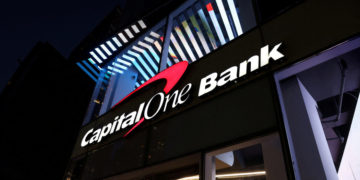Two of the county’s largest credit card companies are poised to merge after key banking regulators approved the deal on Friday, despite concern among some advocacy groups and lawmakers that it could lead to higher fees and less choice for consumers.
Capital One received the green light from the Federal Reserve Board and the Office of the Comptroller of the Currency to acquire Discover Financial Services in a roughly $35 billion deal announced in February 2024. Capital One, the nation’s ninth-largest bank with $479 billion in assets, issues credit cards on networks run by Visa and Mastercard. Acquiring Discover will give it access to a credit card network of 305 million cardholders, adding to its base of more than 100 million customers.
The banks, which said they expected the deal to close on May 18, have argued that the merger would create a stronger competitor to the giants in the network space: Visa and Mastercard. The deal will “increase competition in payment networks, offer a wider range of products to our customers, increase our resources devoted to innovation and security, and bring meaningful community benefits,” Michael Shepherd, the interim chief executive of Discover, said in a statement on Friday.
But after the deal was announced, it was swiftly met with concerns from consumer advocates about concentration in the credit card market, since the country’s biggest credit card issuer would control its own network.
“The feds got this one wrong — so it falls to state attorneys general to intervene against the harmful, anticompetitive Capital One-Discover merger,” Jesse Van Tol, the chief executive of the National Community Reinvestment Coalition, said in a statement. The group, which promotes access to banking services, has opposed the deal since it was announced.
In announcing its approval, the Fed also said it had fined Discover $100 million for overcharging certain interchange fees — transaction fees that a merchant’s bank pays to the credit card-issuing bank — from 2007 to 2023. The O.C.C., in a statement on Friday, said its approval of the deal was conditional on the banks’ addressing “the root causes of any outstanding enforcement actions against Discover Bank and remediation of harm.”
Earlier this month, Capital One cleared another significant obstacle to its acquisition of Discover after the Justice Department, which also has authority to block banking deals, told regulators that it didn’t see sufficient competition concerns to block the merger. Banking analysts said the move indicated that Trump administration regulators might be more open than the Biden administration to bank mergers.
During the Biden administration, the Justice Department had told regulators that it was concerned, in part, about the deal’s impact on potential credit card users who had no credit. In the last months of the administration, the department moved to tighten oversight of banking deals, placing more stringent guidelines on how it evaluates banking deals — the first update to that framework since 2008.
In February, shareholders of both companies approved the all-stock deal, which was valued at roughly $35 billion when it was announced last year.
Danielle Kaye is a business reporter and a 2024 David Carr Fellow, a program for journalists early in their careers.
The post Merger of Capital One and Discover, Two Credit Card Giants, Wins Approval appeared first on New York Times.



















